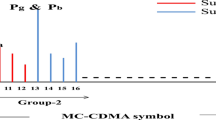Abstract
The Constant Modulus Algorithm (CMA) adopts the constant modulus (CM) criterion to minimize the deviation of the equalizer output from a fixed value. However it has two drawbacks: (1) slow rate of convergence (2) the likelihood of getting trapped in a local minimum. The problem gets even worse when the channel delay spread varies rapidly as the filter length cannot match the delay spread. If the filter length is significantly longer than the delay spread, the convergence rate can be slow. In this paper, we improve the performance of the standard CMA by using a dynamically partitioned hierarchical structure to organize the taps of a filter. The filter length is dynamically partitioned according to the delay spread such that they are tightly matched. Preferably, the length of a sub-filter is slightly longer than the delay spread of the channel. The performance evaluation is divided into two parts. In Part I, we do simulation runs for both the cost functions and cost surfaces comparing the standard CMA, where the filter length is significantly longer than the delay spread, and the dynamically partitioned CMA, where the filter length matches the delay spread. In Part II, an analysis is provided to show that the proposed partitioned scheme can speed up the convergence rate and reduce the cost function.
Similar content being viewed by others
References
Sato Y. (1975) A method of self-recovering equalization for multi-level amplitude modulation. IEEE Transactions on Communications 23: 679–682
Godard, D. N. (1980). Self-recovering equalization and carrier tracking in two-dimensional data communication systems. IEEE Transactions on Communications, COM-28, pp. 1867–1875.
Treichler J. R., Agee B. G. (1983) A new approach to multipath correction of constant modulus signals. IEEE Transactions on Acoustic, Speech and Signal processing 31(2): 459–472
Haykin S. (1996) Adaptive equalizer theory (3rd ed.). Prentice-Hall, New Jersey
Johnson C. R., Jr., Schinter, P., Endres, T. J., Behm, J. D., Brown, D. R., & Casas, R. A. (1998). Blind equalization using the constant modulus criterion: A Review. Proceedings of the IEEE, pp. 1927–1950
Schniter, P. (2000). Blind estimation without priors: Performance, convergence, and efficient implementation. Ph. D. Dissertation, Cornell University.
Schniter P., Johnson C. R. Jr. (2000) Sufficient conditions for the local convergence of constant modulus algorithms. IEEE Transactions on Signal Processing 48(10): 2785–2796
Schniter P, Johnson C. R. Jr. (2000) Bounds for the MSE performance of constant modulus estimator. IEEE Transactions on Information Theory 46(7): 2544–2560
Li Y., Liu K. J. R. (1996) Static and dynamic convergence behavior of adaptive blind equalizers. IEEE Transactions on Signal Processing 44(11): 2736–2745
Li Y., Ding Z. (1995) Convergence analysis of finite length blind adaptive equalizers. IEEE Transactions on Signal Processing 43(9): 2120–2129
Li Y., Liu K. J. R., Ding Z. (1996) Length and cost dependent local minima of unconstrained blind channel equalizers. IEEE Transactions on Signal Processing 44(11): 2726–2735
Mayyas K. (2005) Performance analysis of the deficient length LMS adaptive algorithm. IEEE Transactions on Signal Processing 53(8): 2727–2734
Zhang, Z., Bose, T., Xiao, L., & Thamvichai, R. (2006). Performance analysis of the deficient length EDS adaptive algorithm. IEEE Asia Pacific Conference on Circuit and Systems, 2006 APCCAS, 4–7 Dec. 2006, pp. 222–226.
Shynk, J. J., Gooch, R. P., Krishnamurthy, G., & Chan, C. K. (2007). A comparative performance study of several blind equalization algorithms. Proceedings of the SPIE, Adaptive Signal Processing. Vol. 1565, pp. 102–117, San Diego, CA
Jablon N. K. (1992) Joint blind equalization, carrier recovery, and timing recovery for high order QAM constellations. IEEE Transactions on Signal Processing 40: 1383–1398
Author information
Authors and Affiliations
Corresponding author
Rights and permissions
About this article
Cite this article
Woo, TK. Dynamically Partitioned Hierarchical Constant Modulus Algorithm for Variable Delay Spread Channels. Wireless Pers Commun 62, 395–410 (2012). https://doi.org/10.1007/s11277-010-0060-2
Published:
Issue Date:
DOI: https://doi.org/10.1007/s11277-010-0060-2




